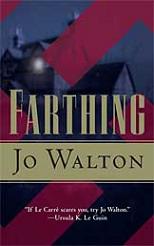
Farthing
Jo Walton
319 pages
published in 2006
At first glance Farthing seems to be a classic English cozy country house mystery, if set in an alternate England. There's the locked room murder taking place during a weekend party at the Farthing country estate. There are the clues pointing all too neatly at one of the guests. There's the doughty detective refusing to believe them and there's the slow deduction of the real killer's identity and motivations. It all feels like something Agatha Christie or Josephine Tey could've written -- the latter's unconscious class snobbery being consciously used here -- but in the end Farthing turns out to be something very different from the cozy mystery or even alternate history tale it masquerades as. This is in fact a horror story, with the horror provided not by the plot or the characters, but through the setting. As Ursula Le Guin puts it in her front cover blurb: "If Le Carré scares you, try Jo Walton".
Farthing grabbed me by the throat from the first page and didn't let go; one of the very few books to have ever done that. As with any other alternate WWII story, part of that is due to what you know is going on in the background that the characters themselves do not know yet or only suspect. Every such Hitler wins story depends on the tension between what the reader knows happened historically and what the characters in the story know or do not know: sometimes this is done explicit, as in Fatherland, where the whole point of the book is to get the protagonist up to speed on what we as readers already know. In Farthing's case though things are kept implicit. What Walton does is let the essential horror of the setting speak for itself, keeping the swastikas and Gestapo goons offstage. What she does in fact is showing that England did not need these props to become a fascist state.
England after all was a deeply racist country before the war, where anti-semitism was deeply ingrained, as anybody who has read classic cozies knows -- even an enlightened writer like Dorothy L. Sayers could talk about a "typical Jew" with all the stereotypes that entails. What Walton does in Farthing is take the casual racism and snobbery of a Josephine Tey and makes it all slightly more explicit and horrid, but still recognisable English. No Kristallnacht, but it is quite casually establish Jews cannot buy land.
The plot revolves around a locked room murder mystery, which is largely an excuse to explain the setting and history of this alternate England. The titular Farthing country house is where the socalled Farthing Set brokered the peace between England and Nazi Germany in 1941, eight years before. Now one of the architects of that peace, Sir James Thirkie, lies murdered there, a yellow Star of David pinned to his chest. Suspicion immediately falls on David Kahn, the Jewish husband of Lucy Eversley, daughter of Lord Eversley. Scotland Yard Inspector Peter Carmichael however is not convinced of his guilt and delves deeper amongst the secrets of the Farthing Set.
The story is told in first person by Lucy Kahn through alternating chapters with a third person narration following Carmichael. Lucy is a bit of a scatterbrain, an intelligent person never taught to focus her intelligence, with an intimate knowledge of the social setting of Farthing, who knows when her family and family friends are not acting like themselves if not why. Carmichael on the other hand is an outsider, a Lancastershire man now living in London having to guess at the behaviour and motives of people not of his class. He can see people are not telling the truth, but class differences make it difficult for him to get to the root of things.
Carmichael is an outsider in more ways than ones, a homosexual living together with his lover masquarading as his butler. He is not the only one: the victim is suspected of being "athenian", as Lucy puts it, as well. Homosexuality historically could be a death sentence if it became public knowledge until much later than you'd suspect, as the sad story of Alan Turing shows, let alone in an England which is happy to be at peace with a nazi Germany ruling the continent and which is slowly taking over many of its prejudices. Carmichael's homosexuality therefore makes him vulnerable as well as more able to see what's wrong with the country. I like how Walton deals with it, as a fundamental part of Carmicheal's character, yet utterly matter of factl about it and with direct consequences for the plot.
When it first came out Farthing recieved a lot more attention than any of Walton's earlier novels had gotten, which might have been because it so perfectly fit the zeitgeist. In essence Farthing shows what happens to a country that has traded its freedom for a little bit more security and while England still calls itself free in the book, it is clear for many people it isn't, while many more people unthinkingly accept this as the natural order of things. Written at a time when contemporary England was busy executing Brazilian electrical engineers in the name of security, you can't help but see the allegory in Farthing, even though Walton never preaches.